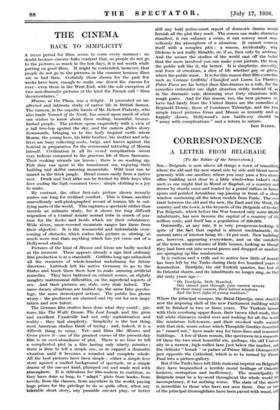THE CINEMA
BACK TO SIMPLICITY
A DEAD period for films seems to come every summer : no doubt because cinema folks contend that, as people do not go to the pictures so much in the hot days, it is not worth while putting on good films. It might be contended, however, that people do not go to the pictures in the summer because films are so bad then. Certainly those shown for the past few weeks have been enough to make one desert the cinema for ever—even those in the West End, with the sole exception of two non-dramatic pictures of the kind the French call " films docurnentaires."
Moana, at the Plaza, was a delight. It presented an un- affected and intimate study of native life in British Samoa. The camera, in the capable hands of Mr. Robert Flaherty, who also made Nanook of the North, has seized upon much of what one wishes to know about these smiling, beautiful, bronze- limbed people. The picture opens exquisitely with a view of lI tall tree-top against the sky, and the camera glides slowy downwards, bringing us to the leafy tropical earth where Moans, the young hero, his little brother, his mother and rela- tives are busy collecting roots, twigs, and leaves against the festival in preparation for the ceremonial tattooing of Moans himself. Civilization in all its vexed complication seems very tedious compared to the gracious life of these Samoans. Their cooking utensils are leaves ; there is no washing up. Fish they can spear in the translucent sea, enjoying their bathing and skilful canoeing meanwhile. Wild boar can be snared in the thick jungle. Bread comes easily from a native root. Drink and food alike can be fetched by little boys who love scaling the high cocoanut trees : simple clothing is a joy to make.
By contrast, the other first-rate picture shown recently makes one long for civilized comfort. This is Grass, another marvellously well-photographed record of human life in out- lying parts of the world. This captures a spectacle rather than records an intimate study, for it shows the long difficult migration of a Central Asiatic nomad tribe in search of pas- ture for the flocks and herds which are their subsistence. Wide rivers, snow-covered mountain ranges bar them from their objective. It is the resourceful and indomitable over- coming of obstacles which makes this picture so stirring, so much more real than anything which has yet come out of a Hollywood studio.
Pictures of the kind of Moana and Grass are badly needed at the moment. There appears already a sign that ordinary film production is at a standstill. Griffiths long ago unleashed all the resources of whole-hearted melodrama for future directors. Lubitsch left his native Germany to go to the States and teach them there how to make amusing artificial comedies. They have battened on cabaret scenes, on slightly naughty matrimonial difficulties, on the superficial aspects of sex. And their pictures are stale, very stale indeed. The same dreary situations are hashed up, the same false psycho- logy, the same stereotyped actions. The public has grown weary : the producers are alarmed and cry out for new inspi- ration and new talent.
The German film studios have done what they could : pic- tures like The Waltz Dream, The Last Laugh, and the grim and excellent Vaudeville had not only sophistication and reality : they had simplicity. Simplicity is the last thing most American studios think of trying ; and, indeed, it is a difficult thing to essay. Yet—and films like Moana and Grass prove it—one of the greatest curses of the present-day film is an over-abundance of plot. There is no time to tell a complicated plot in a film lasting only ninety minutes ; there is time to tell a simple one, or to expand a dramatic situation until it becomes a rounded and complete whole. All the best pictures have been simple : either a simple love story against a unified background of spectacle, or a simple drama of the one-act kind, plumped out and made real with atmosphere. It is ridiculous for film-makers to continue, as they have done so long, to "adapt " plots from books, from novels, from the classics, from anywhere in the world, paying huge prices for the privilege to do so quite often, when any tolerable short story, any passable one-act play, or better still any bald police-court report of domestic drama would furnish all the plot they need. The screen can make character manifest, it can enhance a crisis, it can convey most mar- vellously the atmosphere of a situation. It cannot concern itself with a complex plot : a reason, incidentally, why Dickens is not really filmable, or, if so, then only by sections. And the sooner the studios of the world cast off the belief that the more involved you can make your picture, the more the public will like it, the better. It is simplicity, sincerity, real force of emotions, a slice of life whether gay or grave, which the public want. It is for this reason that film-comedies such as Corinne Griffiths' Classified and Laura La Plante's Poker Faces are far better than film-dramas as a rule, for the comedies embroider one slight situation richly instead of, as in the dramatic vein, skimming over forty situations with rough gusto. And for this reason, too, the best pictures we have had lately from the United States are the comedies of Reginald Denny, those of Constance Talmadge, and the two simple travel pictures Grass and Moana so recently and so happily shown. Hollywood's new battle-cry should be " away with complications " and a return to nature.
fans BARRY.










































 Previous page
Previous page